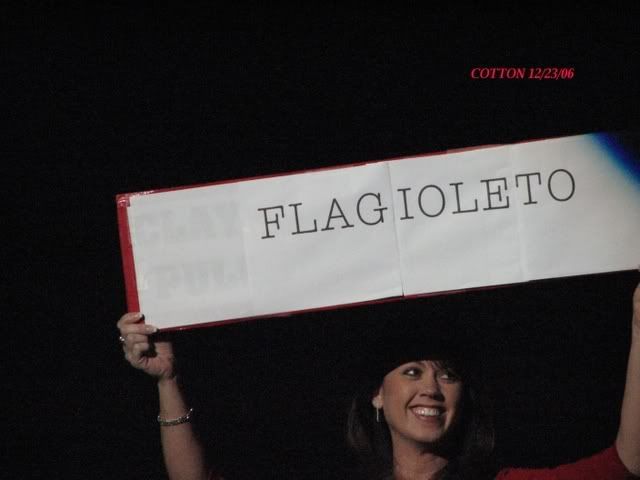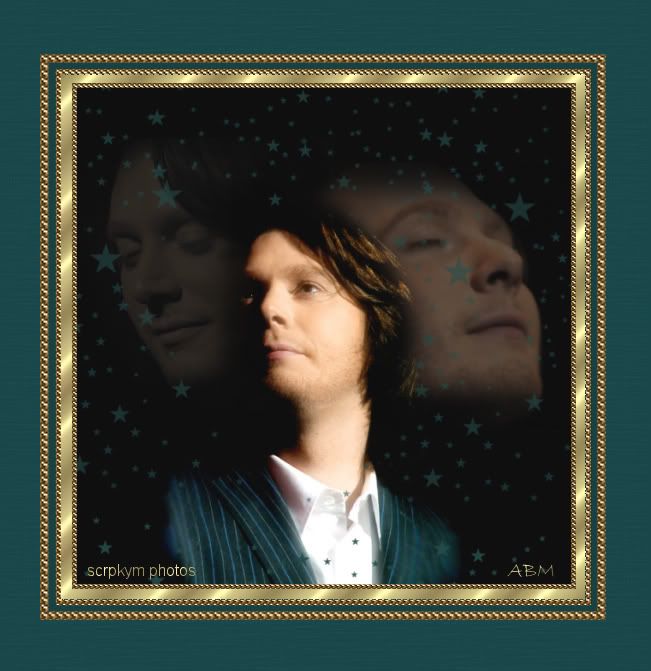
REFLECTIONS -- Cindilu2 aptly entitled her beautiful graphic of Scrpkym's photo from the recent Joyful Not a Tour "Reflections."
More 'Fancy Eye-talian' Words
Musical Terms Provide Grins
In my experience, most musicians -- even the high brow variety -- have a great sense of humor. Sprinkled throughout my previous blogs are many examples of such from my career as a band/orchestra director and symphony musician.
However, Clay Aiken's nightly lessons of "fancy Eye-talian" terms during December's Christmas Symphony Tour prompted this particular post. My old G-3 Mac, a lonesome relic abandoned when I acquired my mobile PC laptop, is loaded with files of musical jokes and other extraneous data.
Yesterday I took a tour through some long-forgotten folders and came up with an addendum to the Joyful Not a Tour glossary of terms. For a complete listing of the JNaT's "Words of the Day," see this blog's P.S., compliments of Cotton, who compiled the definitions.
In the interest of furthering the musical education of CA fans, a smattering of these humorous definitions follows. Students who complete the assignment will be rewarded with not one but two photo intermissions. Just for grins, be sure to name your favorite term in your report.
The "fancy Eye-talian" words generally end with a vowel -- "a," "e," "o" -- but this glossary contains a mixture of English and Italian terms. Tongue in check, here is today's lesson:
Humorous Musical Terms -- Part 1
ACCENT: An unusual manner of pronunciation, eg: "Y'all sang that real good!"
ACCIDENTALS: Wrong notes.
AGITATO: A string player's state of mind when a peg slips in the middle of a piece.
AGNUS DEI: A woman composer famous for her church music.
ALTERED CHORD: A sonority that has been spayed.
ANTIPHONAL: Leaving your answering machine on all the time.
ATTACA: "Fire at will!"
AUGMENTED FIFTH: A 36-ounce bottle.
BAR LINE: A gathering of people, usually among which may be found a musician or two.
BASSO CONTINUO: When the director can't get them to stop.
BEAT: What music students to do each other with their musical instruments. The down beat is performed on the top of the head, while the up beat is struck under the chin.
BRAVO: Literally, "How bold!" or "What nerve!" This is a spontaneous expression of appreciation on the part of the concert goer after a particularly trying performance.
BREVE: The way a sustained note sounds when a violinist runs out of bow.
CADENCE: When everybody hopes you're going to stop, but you don't. (Final Cadence: when they FORCE you to stop.)
CANTUS FIRMUS: (1) The part you get when you can only play four notes. (2) A singer in good physical condition.
CHORD: Usually spelled with an "s" on the end, means a particular type of pants, eg: "He wears chords."
CHROMATIC SCALE: An instrument for weighing that indicates half-pounds.
CLEF: Something to jump from if you can't sing and you have to teach elementary school.
PHOTO INTERMISSION: Clay's sophomore CD, A Thousand Different Ways, and the JNaT highlight this clickable interlude. Featured are graphics by Amazing_CA, photos by Scrpkym, 1; Amazing_CA, photos by Karen Eh, 2 and 5; A Beautiful Mind, photos by Scrpkym, 3; and Claystruck, 4.
Humorous Musical Terms -- Part 2
COLORATURA SOPRANO: A singer who has great trouble finding the proper note, but who has a wild time hunting for it.
COMPOUND METER: A place to park your car that requires two dimes.
CONCERTO GROSSO: An accordion concert.
CONDUCTOR: A musician who is adept at following many people at the same time.
COUNTER TENOR: A singing waiter.
CRESCENDO: A reminder to the performer that he has been playing too loudly.
CUT TIME: When you're going twice as fast as everyone else in the orchestra.
DETACHE: An indication that the trombones are to play with the slides removed.
DISCORD: Not to be confused with Datcord.
DOMINANT: An adjective used to describe the voice of a child who sings off key.
DURATION: Can be used to describe how long a music teacher can exercise self-control.
EXPRESSIVO: Close eyes and play with a wide vibrato.
ETUDE: What comes right before the Beatitudes.
FERMATA: A brand of girdle made especially for opera singers.
FLAT: This is what happens to a tonic if it sits too long in the open air.
FLUTE: A sophisticated pea shooter with a range of up to 500 yards, blown transversely to confuse the enemy.
GLISSANDO: 1.The musical equivalent of slipping on a banana peel. 2. A technique adopted by string players for difficult runs.
GRAND PAUSE: When the conductor loses his place.
PHOTO INTERMISSION: Philosophy and music are highlighted in the second set of JNaT/ATDW graphics. Featured are Cindilu2, photos by Scrpkym, 1; Claysmelody, photos by PermaSwooned and Karen Eh, 2; A Beautiful Mind, photo by Scrpkym, 3; Amazing_CA, photos by Karen Eh, 4; and Ambassador of Love, photos by PinkCocoa/Ztilb, 5.
Humorous Musical Terms -- Part 3
HALF STEP: The pace used by a cellist when carrying his instrument.
HARMONIC MINOR: A good music student.
HARMONY: A corn-like food eaten by people with accents (see above for definition of accent).
HEROIC TENOR: A singer who gets by on sheer nerve and tight clothing.
LAMENTOSO: With handkerchiefs.
LEITMOTIF: Like a regular motif, but less filling.
MEAN-TONE TEMPERAMENT: One's state of mind when everybody's trying to tune at the same time.
METER SIGNATURE: The name of the maid who writes you a ticket when you put an odd number of coins in a duple meter.
PERFECT PITCH: Throwing a banjo in the dumpster without hitting the sides.
POLONAISE: A condiment frequently put on a parrot sandwich.
RIFF: What happens when someone takes your choir robe.
SCORE: Basses 3, Tenors O
SMORZANDO: The "All-You-Can-Eat" buffet at Luciano's.
TEMPO: This is where a headache begins.
TONE CLUSTER: A chordal orgy first discovered by a well-endowed woman pianist leaning forward for a page turn.
TONIC: Medicinal liquid to be consumed before, during, or after a performance.
TRANSPOSITION: The act of moving the relative pitch of a piece of music that is too low for the basses to a point where it is too high for the sopranos.
VIBRATO: Used by singers to hide the fact that they are on the wrong pitch.
VIRTUOSO: A musician with very high morals.
For completing today's LOL lesson, here is a clickable of the Cindilu2 - Scrpkym "Reflections" graphic:
Have an awesome weekend, Clay Nation!
Caro
RELATED TAGS: Clay Aiken, Christmas Symphony Tour, Joyful Not a Tour, A Thousand Different Ways, Humorous Musical Terms, Official Fan Club , Clay Nation
P.S. Throughout December's JNaT, Cotton of Clayversity compiled Clay's nightly music lessons for his fans. This list, currently posted in her OFC blog, is added here with permission. Many thnx, Cotton!
JNaT WORDS OF THE DAY
1. Crescendo (Merrillville) - Soft to loud (not as fun as Aspie's definition!).
2. Decrescendo (Merrillville) - Loud to soft.
3. Fermata (Verona) - Held note.
4. Sforzando (Engelwood) - A sudden burst of sound on a chord.
5. Tremolo (Baltimore) - Tremble; a string player shakes his bow reeeeaaal fast on the string for effect such as in scary music. Another set of definitions: (a) A tremulous effect produced by rapid repetition of a single tone. ( b) A similar effect produced by rapid alternation of two tones. A tremolo performed on a piano would be two notes one octave apart played in rapid succession, i.e., low E high E low E high E.
6. Pizzicato (Norfolk) - I-talian (™CHA) term meaning "pinching." It is used for string instruments to indicate that the strings must be pinched instead of playing with the bow.
7. Col legno (Williamsport) - "Playing with wood"!!! Bwah!!!
8. Ponticello (Wilkes Barre) - Playing close to the bridge of a stringed instrument
9. Glissando (Easton) - Rapid scale passage produced by sliding over keys or strings, e.g. piano, harp, violin, trombone.
10. Bisbigliando (Hartford) – Whispering, i.e., a special tremolo effect on the harp where a chord or note is rapidly repeated at a low volume. A fluttering of the strings of the harp.
11. Flutter-tonguing/Flutter tone (Greenvale/Long Island) -- Jaimie's sign showed 'flutter-tone,' but the terms dictionary had 'flutter-tongue.' In wind instruments, a "coloristic" effect produced by the performer rolling "R" sound while playing.
12. Mallancazzio (West Point) - Playing with the mouthpiece only. (The night of the MADE UP WORD!)
13. Rallentando (RAL-lin-TAHN-doe) (Red Bank) - A directive to perform a certain passage of a composition with a gradual slowing of the tempo
14. Scordatura (skor-dah-TOOR-rah) (Detroit) - The practice of tuning the strings of a stringed instrument differently than the standard tuning. Scordatura is generally used to extend an instrument's range, or to make certain passages easier or more possible to perform; it is also used to achieve certain special effects. Scordatura was popular between 1600 and 1750, and is used rarely now.
15. Marcato (Grand Rapids) - With strong accentuation, strongly accented.
16. Saltando (Jacksonville) - Proceeding in leaps or skips. In bowed string playing, a saltando is a technique of bouncing the bow across the strings, producing a rapid, staccato arpeggio.
17. Tacet (Charlotte) - Don’t Play. An indication in the music that a performer is to be silent for some time. Typically, for an entire section or movement of a composition.

Cousin Jaime Displays Word - Clickable
















1 comment:
Hi Caro.
Did you miss me?
Actually it is not fair you need to approve the comments, that is to easy for you to find them.
Hmmm I will work it out somehow, I will win this game, I will not give up.
Lets see what shall the 4th word be? friends are "venner"
I still love yah
Lis
Post a Comment